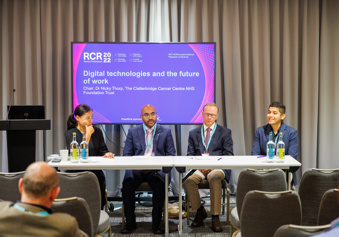
If you want to employ a global doctor
If you are interested in recruiting global doctors, these resources will provide a guide based on our understanding of the relevant processes.
LEARN MOREWe are not experts in employment and immigration law. Your HR department should be able to advise you further on the implications of recruiting doctors in respect of visas and other relevant issues. Different rules may apply to the recruitment of global doctors into training posts.
Visas, recruitment and advertising
- Doctors from outside the UK are likely to need a visa to work in the UK.
- For a consultant or specialty doctor post, or similar, this will be a Skilled Worker visa which has replaced the Tier 2 (General) work visa.
- A Skilled Worker visa requires the migrant doctor to have an employer sponsor - your organisation will need to be an approved sponsor for the overseas doctor to secure the visa. Your HR department will be able to advise you.
- Visa applications can be rejected if important information is incorrectly entered which will lead to a delay in the doctor taking up the post.
- NHS Employers has information on its website about International Recruitment.
GMC registration
- Obtaining General Medical Council (GMC) registration can take some time, so we advise you to start the process at the earliest opportunity. If the doctor to whom you offer a job does not have GMC registration, it may take some time to secure.
- The routes to GMC Registration are set by the GMC, and the College is not able to change these. Registration depends on the type of role the doctor is applying for.
- Full registration on the medical register with a licence to practise is needed to work as a specialty doctor, locum consultant, in fellowship-type posts, and so on. Full GMC registration does not allow a doctor to take up a substantive (permanent) NHS consultant post – specialist registration with a license to practise is needed.
- Doctors with a "relevant European qualification" may be able to apply for GMC full and/or specialist registration using those qualifications. Since Brexit, it is the qualification they hold and not their nationality that determines whether they can use these qualifications to obtain registration. For those without relevant European qualifications, see the above link to routes to GMC registration.
- Sponsorship by the College is an exceptional route to GMC full registration and is part of our commitment to facilitate philanthropic international activity across both our faculties. It is only possible for those taking up a supervised training post for a maximum of two years, before returning to their home country. It cannot be used to employ consultants, specialty doctors, or similar.
Job planning and development for overseas doctors
- You can appoint a suitable global-trained doctor to a locum consultant post (or anything other than a substantive consultant post) if they have full GMC registration. A substantive consultant post requires GMC specialist registration.
- If you can help them prepare for their specialist registration application (CESR) while they are with you, this may turn into a longer-term benefit. They may be offered a substantive consultant post pending their successful application for specialist registration (recognising of course that a successful application nor the length of time the application might take can’t be guaranteed).
- Converting a vacant consultant post to a specialty doctor post may have benefits in expanding the pool of global doctors who have the skills and competence to contribute to the service at that grade while giving them the opportunity in their job plan to prepare for an application for specialist registration and consultant practice.
- Specialty doctors should have the equivalent of at least four years of training, at least two of which must be in a relevant specialty or the equivalent. See our RCR guidance for appointments.
- The Academy of Medical Royal Colleges (AomRC) has issued a joint document about SAS doctor development.
- NHS Employers have an SAS induction checklist.
- To help a global doctor prepare for a CESR application it is useful to support them in consolidating areas of UK training and practice that might not be covered in the same way overseas.
Each CESR application is individual to the applicant, however, generally, we find that is it useful to consider consolidating evidence in these areas:
- Multidisciplinary team (MDT) meetings and associated activity
- Formal appraisal
- Clinical audit and/or quality improvement projects, with evidence as to how and whether a change was implemented
- Active participation in other safety and quality activity such as discrepancy, clinical governance, morbidity, and mortality
- Double-reporting or other experience in curriculum areas that may not have been covered in the doctor’s recent training or experience
Career development
Our expert advice will guide you through all stages of your career, from choosing the right specialty, to offering support through professional networks.
Learn more about career development
